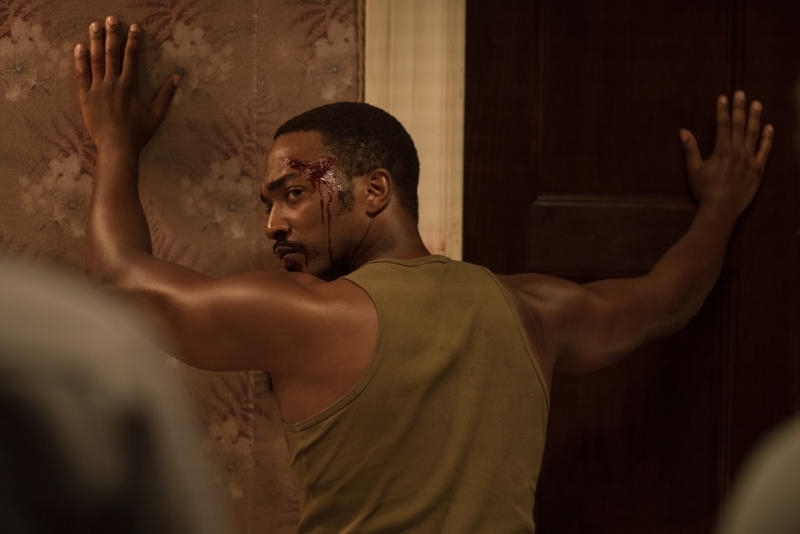
The most dispiriting thing about “Detroit” is how it reminds us of how things haven’t changed, even in the years of Black Lives Matter. Directors Kathryn Bigelow and writer Mark Boal’s third collaboration together (after “The Hurt Locker” and “Zero Dark Thirty”) is as sickening and well directed as expected. But this time, there’s a sense of pointlessness that permeates throughout the whole thing: what does this film have to say about police brutality and racism that we don’t already know?
Sadly, not a whole lot.
Bigelow focuses the majority of the film on one night during the five day long Detroit riots of 1967, when the Algiers Motel was raided in search of an alleged sniper. What followed instead was the beating and torture of several young black men: Larry Reed (Algee Smith) and Fred Temple (Jacob Latimore), singers for vocal group The Dramatics; Carl Cooper (Jason Mitchell), who accidentally triggers the incident with a starter pistol; and veteran Robert Greene (Anthony Mackie), who is caught playing games with Juli Hysell (Hannah Murray) and Karyn Malloy (Kaitlyn Dever), both of whom are white. Philip Krauss (Will Poulter) is the ringleader of the violence while security guard Melvin Dismukes (John Boyega) watches passively and occasionally intervenes.
Watching the psychological torture and brutal beatings that occur for most of the film is truly horrifying to watch. Smith and Mitchell especially prove harrowing given that all they’re given to do is stay up against the wall, scared for their lives. The same can’t be said for Boyega’s Dismukes: there’s a truly fascinating idea to be examined about why he would choose to stay silent while witnessing this obvious breach of authority. But as written, Dismukes is far too passive and flat to truly dig into his motivations.
Similar issues abound for the officers as well; though Poulter gives his all to the performance, Krauss is simply too much of a strawman over-the-top racist to truly feel like a real person. When someone like him is constantly yelling about how he’ll kill everyone in the room, it makes it easy to believe that it truly is just bad apples in the force, rather than problems of the system. In fact, many of the issues “Detroit” attempts to bring up are issues that have been brought to light via the Black Lives Matter movement, but the film doesn’t seem to be saying anything other than “police officers do terrible things to black people and get away with it.”
It’s bad enough dealing with the fact that an officer can get away with shooting a man in his car while he was reaching for his wallet and still walk away in real life; seeing it here just brings to mind victims such as Tamir Rice and Philando Castile and thoughts of the depressing realities.
Bigelow’s best work has always had to do with examining masculinity and machismo, from works as varied as “Point Break” to “The Hurt Locker.” Occasionally she still finds intriguing threads to examine: for instance a scene in which Officer Demens (Jack Reynor) asks Hysell “How come you don’t like white guys?” It drips with entitlement and aggression, suggesting the ways that black men are still stereotyped as animals out to steal white women and the fear that causes white men. And to be honest, it’s a scene tense with the implications of sexual violence. But alas, the script never digs into the moment, quickly moving on to the next theme. It’s frustrating because this type of situation is especially suited to Bigelow’s pet themes of masculinity and presentation, things she explored beautifully through Jeremy Renner in “The Hurt Locker”.
Bigelow is a skilled director of thrillers and she shoots each scene as a tense horror movie in the vein of her past two films, cinema verite style moving camera. But by glossing over the trials (none were convicted) and the start of the riots, she and Boal fail to truly gain context for the primary events. At times it seems almost stubbornly dedicated to providing a simple “Just the facts” approach that would better work for a documentary. As it stands, the end of the film proclaims that the true events were never figured out and that it was reconstructed from the memories of the participants, so there isn’t much of a reason to think about calling this nonfiction.
The subject of the riots may have been even better served as a full fledged documentary in the vein of last years outstanding “O.J.: Made In America”: one that takes time to go over the history of the Great Migration and the rising racial tensions of 1967 while spotlighting the trial and the memories of the victims. The intentions here are well-meaning and I’m not quite sure if the two creative forces (both white, like much of the creative team) are suited to telling this story about black pain.
What is clear is that by the end there’s a sense of pointlessness to the whole endeavor and a feeling of having wallowed in depravity for a good 143 minutes. “Detroit” is a raw and brutal movie befitting its subject matter, but it fails to find something truly meaningful or new to say about police brutality or racism in America. We already see enough black pain in the news and our social media feeds; the question is: do we want to keep seeing it on our screens?

